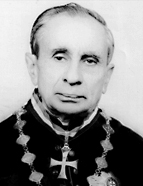

In fact, AJC conclusively proved that the oldest dated non-literary document written in Portuguese is the first will of King Afonso II, drawn up in Coimbra on 27 June 1214, of which two copies are known (one in Braga and the other in Toledo), out of the original thirteen. Let us now return to 1959-1960 to revisit the aforementioned doctoral thesis. The sheer scale of the work's scientific research has led to both praise and criticism, as well as some inelegant assessments and encouraging comments. José Marques notes: "Fr Avelino de Jesus da Costa therefore had to contend with various national and foreign critics, and it was precisely during these challenging times that his profile as a proverbial researcher and a man who was both combative and humble — qualities I am pleased to emphasise — came to the fore." The future confirmed this. After his jubilation, Fr Avelino decided to undertake, like Jean Mabillon, a veritable "war of documents and their hermeneutics." In 1997, at the age of 89, he published the first volume of this significant work (2nd edition reworked and expanded), now entitled O Bispo D. Pedro e a organização da Arquidiocese de Braga [The Bishop of Braga and the Organisation of the Archdiocese of Braga]. Just a few days before his passing, he published the second volume (2000), an event that symbolically seemed to many to represent the anointing or consecration of a man (priest, professor, teacher) who made culture, science, "his" university, and "his" church — especially the Church of Braga — great.
